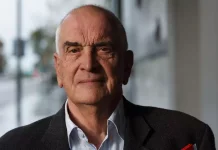Americans are navigating twin pandemics of COVID-19 and white supremacy, according to Episcopal Church Presiding Bishop Michael Curry.
“We’ve seen the ugly face of hatred and bigotry and of white supremacy in the murder of George Floyd,” Curry noted in a July 9 web conference hosted in conjunction with officials from the Evangelical Lutheran Church in America (ELCA). “He wasn’t the first, he won’t be the last, but we must find a better way in the same way of love for neighbor that will help us through the biological pandemic can help us navigate the sociological one.”
Curry and his Lutheran counterpart, ELCA Presiding Bishop Elizabeth Eaton, spoke about their respective denominations’ engagement on issues of public policy, the role of Christians in the public square, and how Lutherans and Episcopalians can best advocate in the political space.
“Start Local”
The online webinar attracted more than 2,400 participants according to ELCA Director of Advocacy Amy Reumann.
The first 40 minutes included comments by the two bishops, followed by presentations by staff with the Episcopal Office of Government Relations and ELCA Advocacy. Each maintain their own respective Washington, D.C. offices, but share some programmatic staff and campaign coordination.
“The work of both of our offices is strictly nonpartisan,” Reumann maintained. “This not only reflects the diversity of opinion in our pews and legal guidelines, but it also is an expression that maintaining relationships on both sides of the aisle is essential for long term effectiveness in influencing policy. As parties in power wax and wane, we need to be in relationship with everyone.”
Asked how churches and clergy could engage in advocacy amidst congregations of diverse political views, Bishop Eaton advised “starting local” with food pantries, clothes closets or community gardens.
“What are the root causes of hunger in your community?” Eaton asked. “Children should not be hungry, that is a compelling argument.”
Some Episcopalians and Lutherans did not see nonpartisanship.
Eaton recalled soon after 2017 presidential inauguration, an ELCA bishop fielded a call from a parishioner upset with clergy criticism of the new Administration, in which the clergy had quoted the beatitudes in the Gospel of Matthew.
“We got letters after that same Sunday for that same reading, who accused us of setting it up,” recalled Curry with a laugh. “It’s not our job to tell people what to do, but it is our job to lift up the values that in our baptism we say we believe.”
Curry said the role of the church was to help people understand how to apply their values in their lives and in the public square.
“We haven’t taught people not just how to do spiritual discernment, but moral discernment enabling us to take action on those moral and spiritual convictions. And I think that’s legitimate terrain to engage and think how that can be done.”
Quoting The Rev. Dr. Martin Luther King, Jr., Curry said that the church is neither the servant nor the master of the state, but rather the conscience of the state. “How do we help our folk to become the conscience that reflects the mind of Christ, and to actively do all of our teaching and formation in a holistic way?”
Intersectionality and Progressive Policy Prescriptions
Asked about food insecurity, Reumann read a question about how the churches were advocating to reduce work requirements as part of SNAP benefits (food stamps).
Episcopal Church Policy Advisor Rashad Thomas, a former staffer with the Democratic think tank Third Way, responded that the “big push” in COVID-related stimulus legislation was for a 15% increase in the maximum allowable SNAP benefit. Eaton added that potentially people on “both sides” of a congregation could support SNAP expansion because of an economic benefit to farmers. Rapidly increasing federal deficit spending and national debt was not addressed.
Eaton and Curry were also asked about racial justice.
“We see that there is a definite intersection between climate change and how it disproportionately effects communities of color and people who are poor. We try to work globally on these issues, especially when there is so much intersectionality amongst them, but we still have a lot of progress to make,” Easton stated. “Everything has to be viewed through the lens of race.”
“What is behind even the discussion about reparations?” Curry posed. “What is really going on there is ‘how do we redeem the past so that we don’t re-live it in the future in new, mutated ways?’”
The webinar featured staff updates from the policy offices, speaking about both civil discourse and advocacy for several policies advanced by the political Left. These included expanded voting by mail, increases in SNAP benefits, and permanent legislative protectors for those illegally brought into the United States as minors (known as “Dreamers”). Church officials also cited “inequalities” that they seek to “highlight and correct” including access to federal assistance for undocumented immigrants in the CARES Act.
“We often sign on to the same letters, the same issues. So we’re the usual suspects,” Eaton said, acknowledging some lawmakers’ perceptions that officials with the two churches are understood to be predictably and uniformly on the political Left. “We’ve started to build broader coalitions. So we have us, but maybe the National Association of Evangelicals signing on and also interreligious colleagues. With that kind of a coalition, people can’t go ‘well, it’s the usual suspects: we’re used to the Mainline denominations, the Unitarians and the liberal religious sisters so that’s fine’ and we have had more success.”
Advocacy on behalf of international religious freedom was also raised. Asked how best to push for the U.S. to continue to uphold human rights globally, Patricia Kisare, Legislative Representative for International Issues with TEC and the ELCA, spoke of engaging with members of Congress serving on the Tom Lantos Human Rights Commission, but also other Representatives and with U.S. agencies charged with interacting with other countries. Especially focused on conflict in Myanmar.
“If you start to look at an issue you care about through the lens of racial justice or something, you can look at that as a human rights issue as well,” Kisare said.
Christians in the Public Square
Curry maintained that the work of advocacy “is the practical working of love in the social and public context.”
The Episcopal Church official speculated it is probably not accidental that Jesus speaks of the spirit of God as ‘the advocate’ – the one who advocates on behalf of God in John chapters 13-17 at the Last Supper.
“Jesus speaks of the work of the spirit and the guidance of the spirit leading the church in days when the church won’t know what it is doing – which actually is most days,” Curry recounted. “He teaches in that same section that love is the way of the spirit and the way of God to navigate uncertain and difficult circumstances.”
Curry stated that “to advocate is to do the work of the spirit of God which is nothing less than the work of love.” And that “we gather in a time of multiple pandemics: one biological, one deeply sociological, both must be engaged with the spiritual.”
“It is a pandemic that has been occasioned and realized by any form of human supremacy over any other human child of God. It is a pandemic of racism.”
Recalling riots of the late 1960s, “It is time to make the parable of the Good Samaritan no longer a parable, but a reality in American society for everybody. Advocacy is one way to practically do that: to put on love on our feet and on our hands, to work to help make this country and this society what we say we want to be: one nation, indivisible, with liberty and justice for all.”
Eaton similarly addressed the role of the church and faith-based organizations in the public square.
“I have been charged with being political and not adhering to the principle of the separation of church and state – that the church should really stick to spiritual matters and stay out of temporal ones,” Eaton said.
Quoting the First Amendment to the U.S. Constitution, Eaton noted that the amendment keeps the government out of the church, but does not preclude the church from showing up in the public square.
“We understand that the church and state the spiritual and the temporal are both established by God and are both part of God’s twofold rule,” Eaton explained, stating that active participation in public life and emphasizing the duty of the government to care for its people have been a part of the Lutheran movement.
Eaton said that Martin Luther, as a spiritual leader, advocated for healthcare, education, and a “community chest” provided by local government.
“Good government is a gift from God and a means by which God’s abundant life can be experienced by all. The U.S. constitution does not bar the church from participating in civil life. Engagement by the faithful in the public square is a way to live out our baptismal vocation. Advocacy is a deeply spiritual discipline.”
Quoting Luther, Eaton said that Christians are not required to do good works to secure God’s grace, but are rather free to serve neighbors: “Advocacy gives us tools to love the neighbor.”










